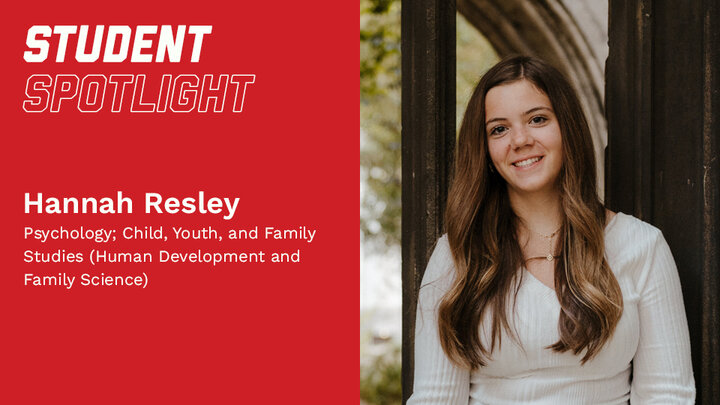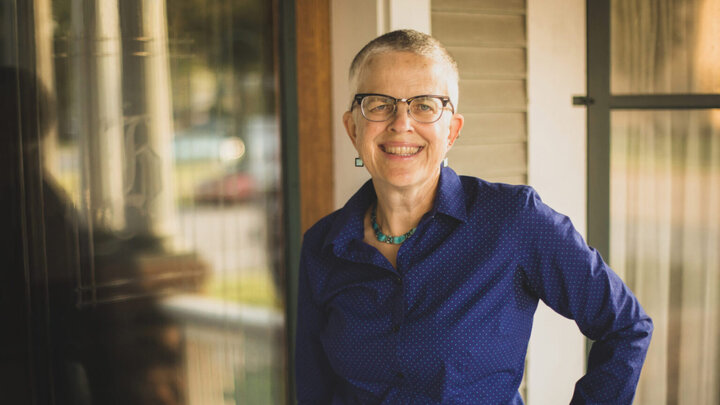Majors: Psychology; Child, Youth and Family Studies (CEHS)
Minor: Coaching
Hometown: Highlands Ranch, Colorado
Hannah can frequently be found in a coffee shop, hiking, or cheering on a Husker volleyball game when she is not in class at the University of Nebraska-Lincoln.
She became interested in the human brain and how it functions during her senior year of high school, which led to her chosen field of study.
“I had a high school teacher who was very influential in my love for learning about the brain and psychology, and he was a huge motivator for me to pursue studying psychology,” Hannah said.
“I decided to add the second major of human development after working at a summer camp and seeing how much I loved kids. I was fascinated to learn how development impacts the brain and psychology of people . . . and the two majors complemented each other really well. I decided to minor in coaching because of my passion for volleyball and wanting to make an impact on kids in sports.”
While a sophomore in the spring semester of 2025, she participated in a research project with Dr. Hillary Schwarb. Hannah had taken PSYC 263 Introduction to Cognitive Processes from Schwarb the year before. She shared that she “found a deep passion for learning how the brain works, specifically memory and the hippocampus.”
“I learned Dr. Schwarb was starting a research project about methamphetamine use and memory,” Hannah said. “I was immediately intrigued and emailed her about learning more. I loved the idea that the research I was doing could make an impact on addiction and methamphetamine use in Nebraska.”
Hannah’s participation in the project, Hippocampal Alteration in Methamphetamine Misuse (HAMM), involved data collection, analysis, and interpretation related to human memory and the supporting memory systems, as well as investigating changes in memory outcomes and brain structure associated with chronic methamphetamine use.
“One impactful moment I had was during a weekly lab meeting, and Dr. Schwarb encouraged the undergraduate assistants to help pick apart a research article related to our research. It was impactful because she provided little guidance for us at first and allowed us to fail before she stepped in to guide us. I learned so much about the research process, how to look at other research and apply it, how to be critical of other research so we can improve our own,” Hannah said.
“I was nervous to fail and let people down, but Dr. Schwarb showed me that failure is a part of research. We don't always get it right; there are a lot of times we will fail. But the important part is to learn from the failures and try again.”
This experiential learning allowed Hannah to hone her research skills while examining data and critically analyzing other research. She also appreciated gaining first-hand experience professionally interacting with research participants and working as a team.
“These are skills you can't learn anywhere else and truly make you a better scientist,” Hannah said. She credits her faculty sponsor for providing mentorship that has been immensely instrumental in increasing her overall confidence and growth.
“Dr. Schwarb has had a big impact on my experience because she trusts me and wants me to grow and learn. She challenges me in ways that I need and guides me when I need it.”
In the middle of her undergraduate degree, Hannah is already anticipating how she will apply this experiential learning to reach her goals after graduation.
“I want to get my PhD in neuropsychology and help those who have experienced Traumatic Brain Injuries and other types of brain injuries,” Hannah said. “This research almost directly relates to that because we will learn more about the structure of the hippocampus and memory and how to help those who have damaged it due to methamphetamine use.”
Hannah sees herself using the research results as a practitioner with her patients in the future and shares the value of her spring semester research project.
“Learning how to do proper psychological research now will only benefit me in my future academic career.”




